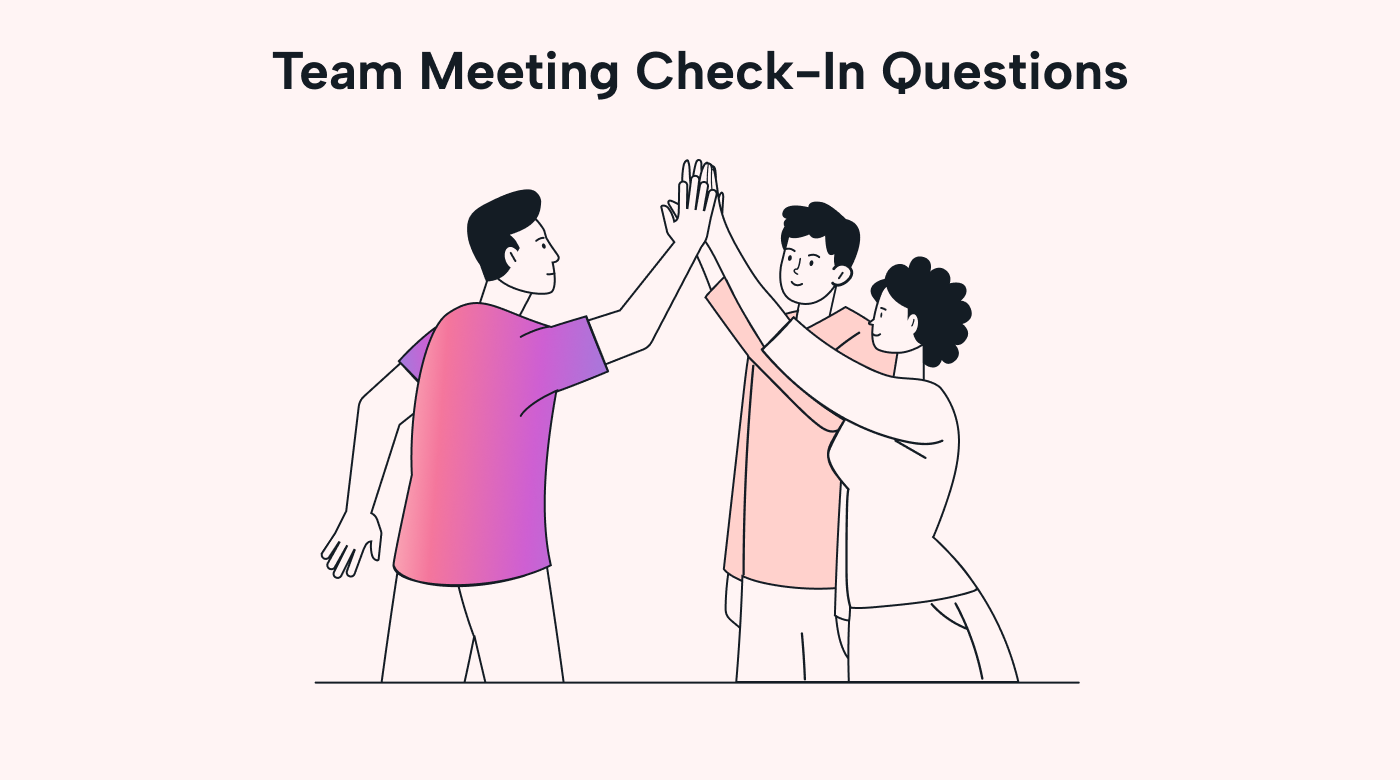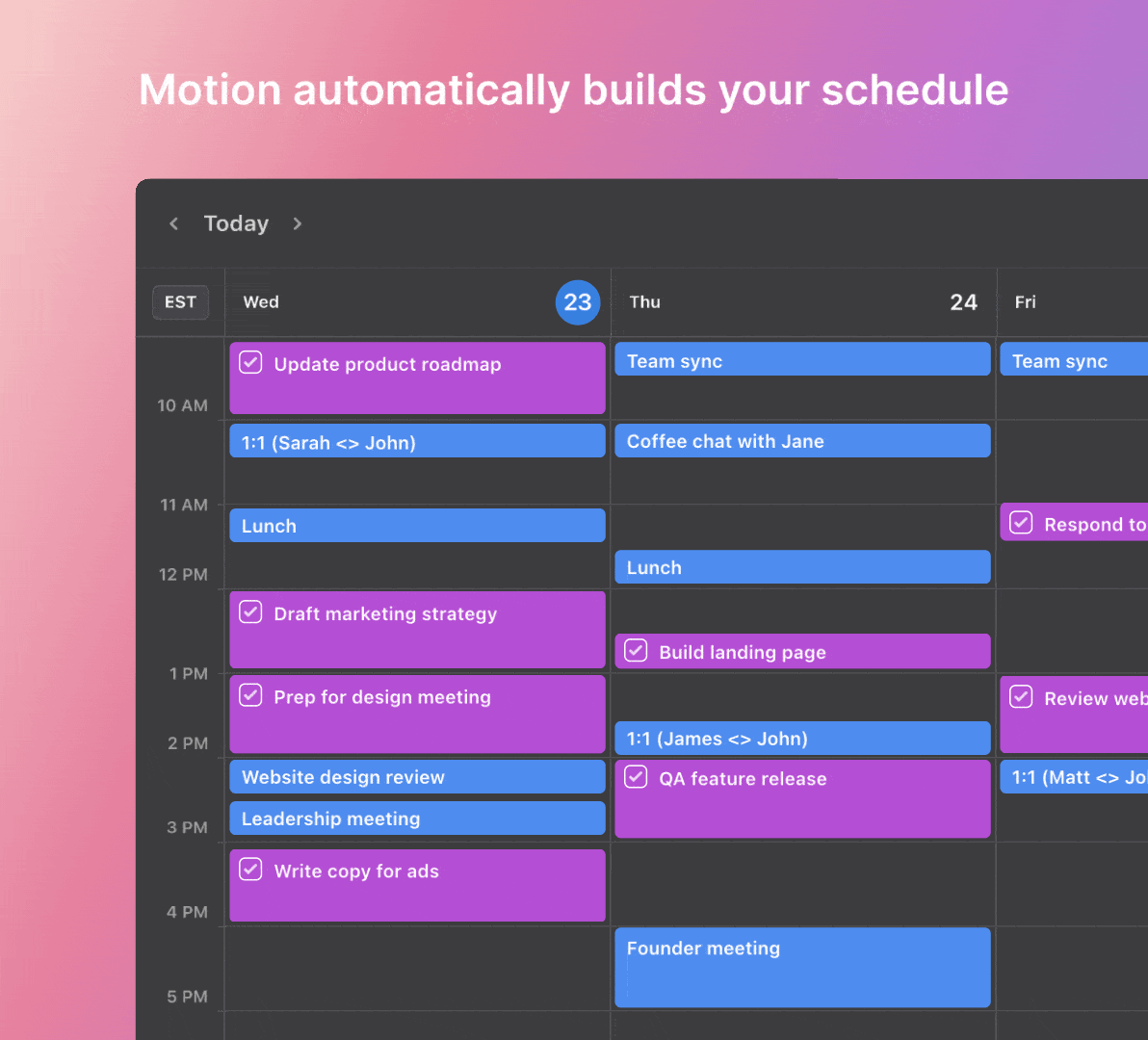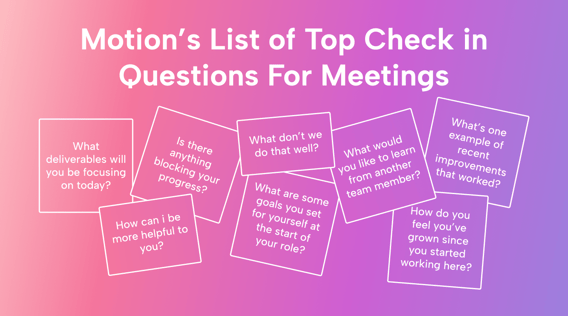What was the worst haircut you ever got? What did you accomplish yesterday? Who deserves to be thanked? What went well with this project? Which actor would you choose to portray you in a film?
What do these questions all have in common? They are check-in questions.
If a meeting only consists of “checking in,” it will likely not be productive.
Despite this, using check-ins as part of a bigger objective for the meeting can be highly beneficial. Check-in questions can quickly bring out needed updates, create a sense of team solidarity, and keep team members informed of the different aspects of a complex project.
Check-in questions for team meetings are quick questions asked at the beginning of a meeting to help participants get more comfortable before they dive into the agenda and topics of the day. And to make boring meetings just a bit more interesting.
Questions posed during check-in can be helpful to kick off the meeting, get everyone in the same mindset, and assess the current feelings and anticipations of the attendees.
If you are looking for ways to make your check-in part of your meeting productive, this post is for you. In this article, we'll review check-in questions for meetings, including daily stand-ups, project gatherings, one-on-ones, icebreakers, and group meetings.
What makes a great check-in question?
Different meetings call for different types of check-in questions.
In some situations, you may want to gauge the attitude of direct reports, while in others, you could verify whether tasks were accomplished or engaging with the entire group.
No matter what kind of meeting it is, check-in questions are always a beneficial first step for any meeting agenda.
Excellent check-in questions share some similarities that help them to be successful:
- Frame your questions in a manner that’ll generate discussion but can be responded to promptly.
- Ask questions that uncover something noteworthy or unique about the people you are engaging with.
- Refrain from asking politically contentious questions.
Type of meetings you should use check-in questions
Check-in questions are often useful in meetings where everyone is actively involved in the discussion, but they're less useful in meetings where people are simply listening and taking notes. They work best for meetings like:
- Stand-up meetings are daily meetings used mainly by Agile teams to (quickly) go over current tasks.
- Team meetings are used to discuss important matters across a team.
- Project meetings are typically focused on the details of a project as it moves through different phases or milestones.
- One-on-one meetings mostly involve a team member and a manager working together to provide feedback or a way for the leader to coach the employee.
- Brainstorming meetings are creative get-together sessions where team members share their ideas to solve a problem.
- Feedback meetings can happen from the top down or bottom up, but the core idea is to give constructive advice to help someone perform better next time.
- Sprint reviews are held at the end of a sprint to present an iteration of work to the client or stakeholders so that you can get feedback for the next sprint.
- Retrospectives are held at the end of a project or venture to go over what went well and what didn’t so that you can plan better for the next initiative.
What are check-in questions helpful for?
Asking open-ended questions (and active listening) creates a sense of camaraderie, builds psychological safety, and establishes a bond between team members. This counts for in-person meetings and virtual meetings.
Having a check-in at the beginning of your meeting isn’t just a matter of crossing something off your list—it’s about developing true rapport with your group, which opens the door to constructive feedback and better collaboration.
A strong team culture eats a strategy for breakfast any day, and actionable questions can be a great culture hack.
This is especially true for remote teams, where human element can be lacking lacking. Check-ins as part of your meeting culture can help to make up for some of that.
Boost team productivity with these check-in questions
Next, let’s review check-in questions you can apply to the meetings we discussed.
Icebreaker questions for any meeting
Icebreaker questions can be fun questions to help people feel more familiar with each other. They work well for meetings, from project management follow-ups and status reviews that don’t engage staff much to brainstorming sessions and daily scrums.
 |
Here's a list of fun check-in questions:
- If your team had a mascot, what would it be?
- What unusual flavor should Ben and Jerry’s introduce?
- What historical figure would you like to have dinner with?
- How do you define your fashion sense?
- What was the worst haircut you ever got?
- What would you do during a zombie apocalypse?
- If you had access to a time machine, where would you go?
- What would it be if you had to pick only one app on your cell phone?
- What is the most important tip you have ever given someone?
- What would it be if you had the opportunity to lecture on one subject?
- Which actor would you choose to portray you in a film?
- What two skills do you excel in?
- Which of your colleagues would you like to learn more about?
Daily stand-up check-in meeting questions
These brief sessions help teams review important information and keep the project in constant evolution. They’re typically used among development teams but can be used by any team producing work at speed.
Some of the most common check-in questions used for daily stand-ups at most organizations are:
- What did you accomplish yesterday?
- What are your plans for today?
- What challenges will you face today?
- What are you excited about today?
- What will help you focus today?
- What help do you need today?
Project meeting check-in questions
If you know what questions to ask, you can prevent problems from turning ugly before they do. In fact, these are great questions to ask o yourself and others during the planning and initiation stages:
- What metrics will you use to measure success with this project?
- What aspects are you most excited about?
- What is the estimated timeline for the upcoming tasks?
As the project progresses, use these questions to keep your fingers on your team's pulse:
- What have you successfully achieved?
- Is there anything that needs to be adjusted?
- Are we exceeding expectations or falling short?
- How are you controlling the workload?
- Are you keeping up with the timeline, or are you lagging?
Team meeting check-in questions
The right team check-in questions can be a win-win situation. They can bring the team together and draw out key information.
 |
Use these powerful team-building questions:
- What's the team's biggest issue?
- Who deserves to be thanked?
- What team goals did we meet?
- What makes us successful?
- What could we do better?
- What knowledge would you like to glean from one of your colleagues?
- What recent changes have been successful?
- How can we be better prepared for any potential interruptions?
- How can we better express our gratitude to you?
One-on-one check-in questions
Asking the right check-in questions in a one-on-one session (in a safe space) helps to grow a strong, human-centric connection between the people involved.
Here are some good work-life balance questions to use:
- Do you have any new insights about yourself since our last conversation?
- Are there any personal goals that you are proud of?
- Are there any new career goals you want to talk about?
- What have been the most thrilling aspects of work lately?
- What steps are you taking to better yourself?
- How can we aid you in your personal life?
- If you were in control of the team, what successes would you go for first?
- What is your current mindset?
- At what point do you find yourself the most/least productive?
- How do you feel about the company culture and atmosphere?
Brainstorming check-in questions
Teamwork makes dreams work, right?
When we come together as a team to brainstorm, amazing things can occur.
Although difficult to kick-start, it can be rewarding to evoke group creativity and generate collective solutions.
Here, the right type of check-in questions can help to get the creative or problem-solving juices going:
- What are the goals we hope to achieve today?
- What facts, figures, or details can we use to gain a better understanding of this problem? What extra sources or data do we need to address this issue?
- What about the current project is exciting?
- What possible issues could arise with this project?
- How would you give a brief overview of it?
- Could you explain the potential difficulties in an easy-to-understand way?
- What sets our organization (or team) apart from others and gives us the ability to complete this project?
Feedback meeting check-in questions
Leading a feedback meeting with check-in questions helps uncover employee needs, improvement, growth, and goals.
Check-in questions should be open-ended and reciprocal in nature, just like these meetings. Ask your team members the right way, and they'll feel inspired instead of intimidated.
Try the following questions:
- How can I be a more helpful leader to you?
- What changes have you noticed in yourself since you began working here?
- What tools do you think will help you and the team?
- How do you think we can improve as a team?
- How often do you feel you need to receive feedback from your managers?
Sprint review check-in meeting questions
If running a super-long sprint, you could use the following sprint check-in questions to get feedback during the sprint:
- On a scale from 1 to 5, how confident are you that we've met this sprint’s deliverables?
- On a scale from 1 to 5, how confident are you that the rest of the team can deliver their deliverables?
- Are you satisfied with how your team progresses with the sprint tasks?
Retrospective check-in meeting questions
A retrospective, sometimes referred to as a retro, is a meeting at the end of a sprint or project to think back, assess the work done, and find ways to improve future performance (and results).
Reflecting on the past can be useful in detecting things hindering teams from achieving peak productivity (and contentment).
Weekly retrospectives are common practice in Agile work environments, as they help to nurture a culture of continuous improvement and development.
Ask questions that help people reflect, like:
- How effective was this sprint or project?
- What went well with this project?
- What didn't go well?
- What are the lessons you learned?
3 tips to keep in mind when you do check-in questions
With the right set of questions, you’re one step closer to making your meetings more engaging and getting more out of them.
Be inclusive
Be mindful of people's viewpoints and try to tailor your questions to meet people from diverse backgrounds.
Steer clear of personal questions. If unsure, go with neutral, open-ended questions.
And, most importantly, practice active listening!
Before you check in, check yourself
It’s helpful to have a purposeful approach when asking questions.
Ask yourself:
- What advantages does this check-in question provide for me, the whole group, or an individual?
- Is what I’m asking reasonable? Can someone answer it in less than a minute or two? Or am I creating a major disruption to their workflow?
- What value does this question provide?
Set the environment
Create a safe space and inviting atmosphere to encourage people to express themselves openly.
If your direct reports are uncomfortable answering your questions, you won't get the honest answers you need.
Run your meetings with Motion
Asking check-in questions for meetings is a basic but essential means of getting to know your employees and colleagues better. Team leaders and facilitators should use a variety of tools to create the most optimal environment for meetings to succeed.
 |
Motion has a host of tools that can help you improve the work environment.
It is a calendar that can replace your current calendar for booking meetings but it's also so much more. It’s a task manager, a project manager, and a booking manager.
The Motion Meeting Assistant offers auto-rescheduling and integrates with everyone's work calendar, finding the best times for everyone (internal and external) so that you can keep the meetings locked in and as effective as possible.
Sign up for your 7-day free trial.





